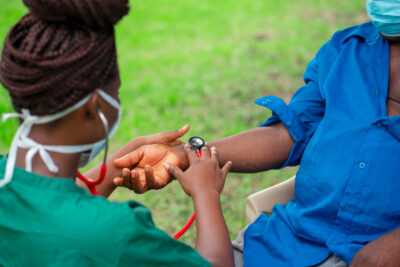The Labo Moto project, a joint initiative of the Pan American Health Organization (PAHO) and the Haitian Ministry of Health, provides “nurses on wheels” who travel across the country by motorcycle to collect cholera samples from suspected cases and deliver them for laboratory analysis, contributing to rapid diagnosis and response.
The Labo Moto project began during the 2017 cholera outbreak to reduce the number of deaths in remote communities due to lack of timely diagnosis and treatment.
As many of these communities are hard-to-reach, the idea of nurses on wheels came about as a way for health workers to access these areas, collect high-quality samples, transport the samples to the national or department laboratory for processing, and report results that will guide cholera response activities. This is key to catching cases early to slow down the spread of the disease.
Since then, the project has continued to operate throughout the country and is also playing a key role in managing the current epidemic, which began in October 2022.
There are 28 Labo Moto nurses stationed in Haiti’s West, Center, Artibonite, North and Northeast Departments who, since the beginning of the current epidemic in October, have facilitated the collection of 3461 samples. Results are then communicated to the relevant hospital or health center to confirm cholera so that access to life-saving treatment is rapidly set-up and preventive measures are put in place.
“When we receive alert of suspected cases from an institution or community, we promptly go to that area and take samples. This allows us to quickly find out if cholera is present,” Granville Marie Nicole, one of the nurses in charge of sampling in the West Department, said.
Labo Moto nurses must carefully manage the transport of cholera samples to ensure they remain intact. This includes maintaining their temperature and ensuring fast delivery to the lab.
This has become particularly difficult during the most recent epidemic due to insecurity and lack of fuel. Since 2 October 2022, there have been more than 20,000 suspected cholera cases in Haiti, but some areas are held by gangs and roads are virtually impassable.
“When the roads are blocked, we cannot deliver samples on time. People are suffering and the quality of cholera samples decreases if they are left too long before analysis,” a Labo Moto nurse said.
When transporting samples by motorcycle becomes too difficult, nurses coordinate with other forms of ground, sea and even air transport to deliver them to the laboratory on time, for example using helicopter services from the United Nations Humanitarian Air Service (UNHAS). In addition, five sub-national laboratories in public and private hospitals (in the Artibonite, Center, South and North Departments) have been reactivated to help overcome this difficulty.
Despite the difficulties and challenges, Labo Moto nurses continue to help communities as part of the response to better manage and control the current cholera epidemic in Haiti.






